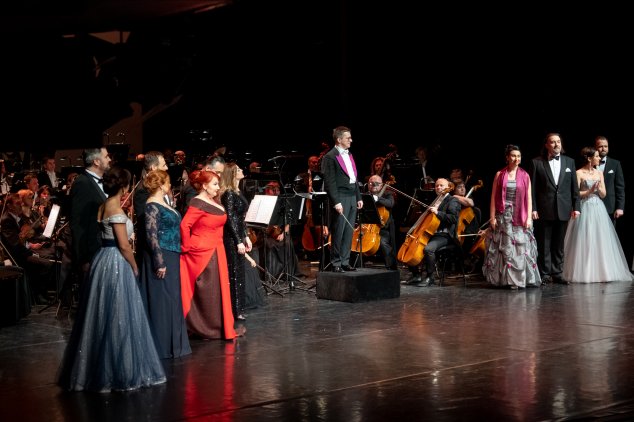
“Bel Canto: The Joy of Singing”: The Kraków Opera to Celebrate the Ryszard Karczykowski Jubilee
“Bel Canto: The Joy of Singing”: The Kraków Opera to Celebrate the Ryszard Karczykowski Jubilee
Bellini, Donizetti, Rossini, Verdi... fragments of best-known works of the masters of Italian opera, performed by excellent Soloists and the Orchestra and Choir of the Kraków Opera, will be presented at the stage at ul. Lubicz during the “Bel Canto: The Joy of Singing” gala on 6 November at 6.30 p.m. The special guest at the performance will be Ryszard Karczykowski, a brilliant tenor and artistic director of the Kraków Opera between 2003 and 2006 who celebrates the 60th anniversary of his artistic work this year.
Ryszard Karczykowski was born in Tczew and graduated from the State Higher School of Music in Gdańsk in the class of Halina Mickiewiczówna and music direction at Musikhochschule Eisler in Berlin. He performed as a soloist at the stages in Dessau, Leipzig, Dresden, London, Vienna and Berlin. The breakthrough in his career was his role in G. Verdi's “Traviata” during the Aix-en-Provence Festival in 1976 and in “The Revenge of the Bat” (next to Kiri Te Kanawa, under the supervision of Zubin Mahta) in Covent Garden in 1977. Since that time, he sang in opera and concert halls in Europe, Asia and both Americas, together with the best-known soloists, including Ileana Cotrubas, Agnes Baltsa, Sylvia Sass and Placido Domingo. The Kraków audience knows him primarily as the artistic director of the Kraków Opera between 2003 and 2006; singers from the Academy of Music in Kraków remember him as the long-term teacher and mentor.
A concert devoted to the masterpieces of the bel canto opera is the most proper form of celebrating the jubilee of the excellent singer: bel canto comprises works that demonstrate the highest technical skill and virtuoso artistry that a human voice is capable of accomplishing, and at the same time celebrate its beauty and the ability to stir the audience. The undisputed masters of this genre were G. Rossini, G. Donizetti and V. Bellini, who made excellent use of the clearly musical elements of the “beautiful singing”, at the same time not forgetting about the dramatic expression - both in the light and jocular opera buffa (Rossini’s “The Barber of Seville”, Donizetti's “The Elixir of Love”) as well as opera seria, a tragedy with a frequently gory finale. These accomplishments were acquired and subsequently processed by G. Verdi; gradually, he moved away from the formalised aspects of bel canto, looking for deeper dramaturgy and psychological realism, yet without losing the noble charm of the human voice from sight - the echoes of the bel canto style are also resounding in his later works, e.g. in Desdemona's scene from “Othello.”
During the concert, the Soloists of the Kraków Opera and artists invited for cooperation: Agnieszka Cząstka-Niezgódka, Monika Korybalska, Agnieszka Kuk, Paula Maciołek, Katarzyna Oleś-Blacha, Robert Gierlach, Tomasz Kuk, Michał Kutnik and Volodymyr Pankiv will give their performances. They will also be joined by the students of the Voice and Drama Faculty of the Kraków Academy of Music, Kamila Dutkowska and Adrian Domarecki. The Soloists will be accompanied by the Orchestra, the Choir and the Ballet of our Opera conducted by Tomasz Tokarczyk. The repertoire will feature arias, ensembles and choir parts from operas well known to the Kraków audience (among others, Donizetti’s “Don Pasquale” and “The Elixir of Love” or G. Rossini’s “The Barber of Seville”), but also from G. Verdi’s “The Troubadour”, “Rigoletto” and the rarely performed “Sicilian Vespers.” The concert will be opened by the overture from V. Bellini's “Norma.”
A concert devoted to the masterpieces of the bel canto opera is the most proper form of celebrating the jubilee of the excellent singer: bel canto comprises works that demonstrate the highest technical skill and virtuoso artistry that a human voice is capable of accomplishing, and at the same time celebrate its beauty and the ability to stir the audience. The undisputed masters of this genre were G. Rossini, G. Donizetti and V. Bellini, who made excellent use of the clearly musical elements of the “beautiful singing”, at the same time not forgetting about the dramatic expression - both in the light and jocular opera buffa (Rossini’s “The Barber of Seville”, Donizetti's “The Elixir of Love”) as well as opera seria, a tragedy with a frequently gory finale. These accomplishments were acquired and subsequently processed by G. Verdi; gradually, he moved away from the formalised aspects of bel canto, looking for deeper dramaturgy and psychological realism, yet without losing the noble charm of the human voice from sight - the echoes of the bel canto style are also resounding in his later works, e.g. in Desdemona's scene from “Othello.”
During the concert, the Soloists of the Kraków Opera and artists invited for cooperation: Agnieszka Cząstka-Niezgódka, Monika Korybalska, Agnieszka Kuk, Paula Maciołek, Katarzyna Oleś-Blacha, Robert Gierlach, Tomasz Kuk, Michał Kutnik and Volodymyr Pankiv will give their performances. They will also be joined by the students of the Voice and Drama Faculty of the Kraków Academy of Music, Kamila Dutkowska and Adrian Domarecki. The Soloists will be accompanied by the Orchestra, the Choir and the Ballet of our Opera conducted by Tomasz Tokarczyk. The repertoire will feature arias, ensembles and choir parts from operas well known to the Kraków audience (among others, Donizetti’s “Don Pasquale” and “The Elixir of Love” or G. Rossini’s “The Barber of Seville”), but also from G. Verdi’s “The Troubadour”, “Rigoletto” and the rarely performed “Sicilian Vespers.” The concert will be opened by the overture from V. Bellini's “Norma.”